From Jammu Kashmir to Maharashtra, in a land of empty advertising
slogans and fantastic wealth that barely conceals vast poverty, you can
see the first signs of a popular new uprising.
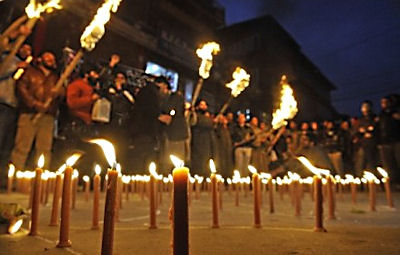 |
| Supporters of Jammu Kashmir Liberation Front hold torches during a protest march to mark International Human Rights Day in Srinagar, 10 December 2011 - New Statesman |
When the early morning fog rises and drifting skeins from wood fires
carry the sweet smell of India, the joggers arrive in Lodi Gardens. Past
the tomb of Muhammad Shah, the 15th-century Mughal ruler, across a
landscape manicured in the 1930s by Lady Willingdon, wife of the
governor general, recently acquired trainers stride out from ample
figures in smart saris and white cotton dhotis. In Delhi, the middle
classes do as they do everywhere, though here there is no middle. By
mid-morning, children descend like starlings. They wear pressed blazers,
like those of an English prep school. There are games and art and
botany classes. Shepherded out through Lady Willingdon's elegant stone
gateway, they pass a reed-thin boy, prostrate beside the traffic and his
pile of peanuts, coins clenched in his hand.
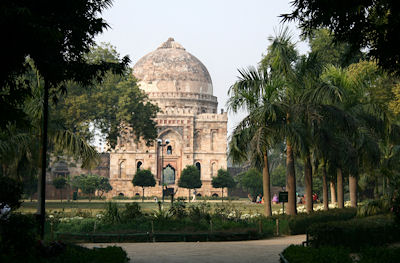 |
| A detail of beautiful Lodi Gardens in the wealthy south end of Delhi. Sheesh Gumbad, in the center is one of several impressive mausoleums that dot the park. |
When I was first
sent to report on India, I seldom raised my eyes to the Gothic edifices
and façades of the British Raj. All life was at dust and pavement level
and, once the shock had eased, I learned to admire the sheer imagination
and wit of people who survived the cities, let alone the countryside -
from the dabbawallah (literally "person with a box") to the cleaners,
runners, street barbers, poets, assorted Fagins and children with their
piles of peanuts.
In Calcutta, as it was still known during the
1971 war with Pakistan, civil defence units in soup-plate helmets and
lungis toured the streets announcing an air-raid warning practice during
which, they said, "everybody must stay indoors and remain in the
face-down position until the siren has ceased to operate". Waves of
mocking laughter greeted them, together with the cry: "But we have no
doors to stay inside!"
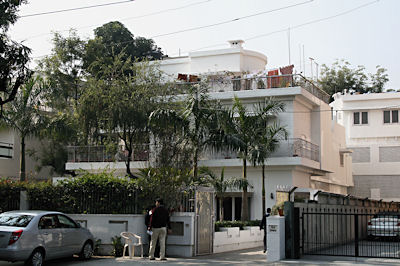 |
| One of the numerous luxury buildings in Delhi |
Predators
After the imperial
capital was moved to Delhi early in the 20th century, New Delhi was
built as a modernist showpiece, with avenues and roundabouts and a mall
sweeping up to the viceroy's house, now the president's residence in the
world's most populous democracy. If the experience of colonialism was
humiliating, this proud new metropolis would surely be enabling. On 15
August 1947, it was the setting for Pandit Nehru's declaration of
independence "at the midnight hour". It was also a façade behind which
the majority hoped and waited, and still wait.
This notion of
façade is almost haunting. You sense it in genteel Lodi Gardens and
among the anglicised elite with their enduring ambiguity. In the 1990s,
it became a wall erected by the beneficiaries of Shining India, which
began as a slogan invented by an American advertising firm to promote
the rise of the Hindu nationalist BJP-led government. Shorn of Nehru's
idealism and paternalism, it marked the end of the Congress Party's
pretence of class and caste reconciliation: in other words, social
justice. Monsanto and Pizza Hut, Microsoft and Murdoch were invited to
enter what had been forbidden territory to corporate predators. India
would serve a new deity called "economic growth" and be hailed as a
"global leader", apparently heading "in what the smart money believes is
the right direction" (Newsweek).
India's ascent to "new world
power" is both true and what Edward Bernays, the founder of public
relations, called "false reality". Despite a growth rate of 6.9 per cent
and prosperity for some, more people than ever live in poverty in
India, and more of them than anywhere else on earth, including a third
of all malnourished children. Save the Children says that every year two
million Indian infants under the age of five die.
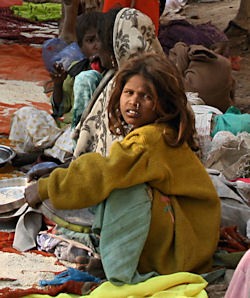 |
| Beggar girl at a huge festival in Varanasi. Millions of children are begging while the world is dancing. |
The façades are
literal and surreal. Ram Suhavan and his family live 60 feet above a
railway track. Their home is the inside of a hoarding that advertises,
on one side, "exotic, exclusive" homes for the new "elite" and, on the
other, a gleaming car. This is in Pune, Maharashtra, which has "booming"
Bombay and the nation's highest suicide rate among indebted farmers.
Start the fightback
Most
Indians live in rural villages, dependent on the land and its rhythms
of subsistence. The rise of multinationals' monopoly control of seed,
forcing farmers to plant cash crops such as GM cotton, has led to a
quarter of a million suicides, a conservative estimate. The
environmentalist Vandana Shiva describes it as "recolonisation".
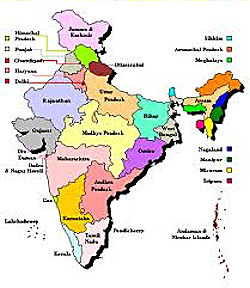 |
| Maharashtra is the huge state surrounding Mumbai (Bombay) - middle west: Jammu Kashmir is obviously in the north, the highly disputed and the most militarized zone in the world. Orissa is in the central east. |
Using
the Land Acquisition Act of 1894, central and state governments have
forcibly dispossessed farmers and tribal peoples in order to hand their
land to speculators and mining companies. To make way for a Formula One
racetrack and gated "elite" estates, land was appropriated for $6 a
square metre and sold to developers for $13,450 a square metre. Across
India, communities have fought back. In Orissa State, the wholesale
destruction of betel farms has spawned a resistance now in its fifth
year.
What is always exciting about India is this refusal to
comply with political mythology and gross injustice. As Sunil Khilnani
wrote in The Idea of India: "The future of western political theory will
be decided outside the west." For the majorities of India and the west,
liberal democracy is now diminished to "the assertion of an equal right
to consume [media] images".
In Kashmir, a forgotten India barely
reported abroad, a peaceful resistance as inspiring as Tahrir Square
has arisen in the most militarised region on earth. As the victims of
Partition, Muslim Kashmiris have known none of Nehru's noble legacies.
Thousands of dissidents have "disappeared" and torture is not uncommon.
"The voice that the government of India has tried so hard to silence,"
wrote Arundhati Roy in 2008, "has massed into a deafening roar. Hundreds
of thousands of unarmed people have come out to reclaim their cities,
their streets and mohallas. They have simply overwhelmed the heavily
armed security forces by their sheer numbers, and with a remarkable
display of raw courage." An Indian spring may be next.
Source: New Statesman

